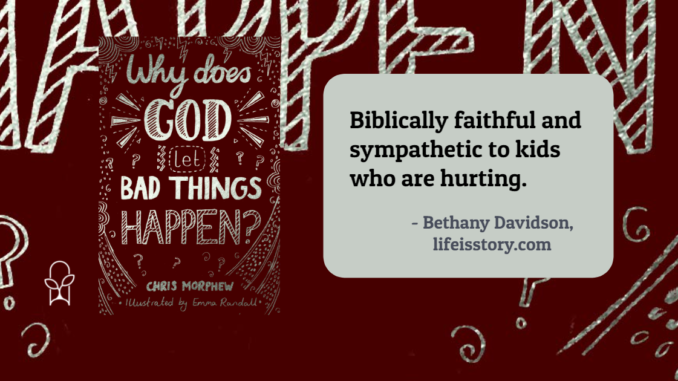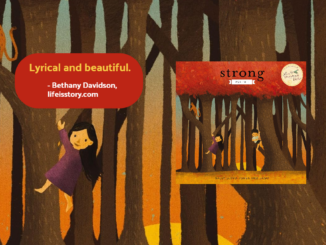
Also by this author: How Do We Know Christianity Is Really True?, What Happens When We Die?, Who Am I and Why Do I Matter?, How Can I Feel Closer to God?, How Can I Be Sure What’s Right and Wrong?, Worth It: Following Jesus When Life Feels Complicated, What Are Hands For?, What Are Ears For? Board Book, What Are Feet For? Board Book, Your Magnificent Mouth: A Training Young Hearts Rhyming Book, Guide for Grown-ups: A Training Young Hearts Book
Series: Big Questions #3
Published by Good Book Company on May 1, 2021
Genres: Children's, Children's Educational
Buy on Amazon
Goodreads

Sooner or later, kids have big questions about God, life, faith and the Bible, especially when their friends start asking them about what they believe. A common one is: Why does God let bad things happen?
Big questions deserve good answers. This warm, reassuring and fast-paced book looks at what the Bible says to help 9-13s think through this big question for themselves. It puts the problem of suffering in the context of the Bible's big story, and encourages readers to see that whatever they're facing, Jesus is with them. Lively stories and illustrations make this book easy for this age group to engage with.
Chris Morphew, a teacher and school chaplain from Australia, has written a series of short books to answer kids’ common questions about Christianity. Why Does God Let Bad Things Happen? addresses a question essential to people’s emotional lives and endurance in the faith, and Morphew writes in an engaging, conversational, and sympathetic style, explaining complex ideas in a kid-friendly way without oversimplifying his answers or making light of the profound pain that leads people to struggle with this part of their faith.
I was about twelve when I started looking for an answer to this question. Even though I had lived a very sheltered and privileged life, my mental health fell apart in absolutely terrifying ways, and I started reading books like this to try to understand what was going on and why God would let this happen when I was trying to follow Him. The highest praise I can give to this book is that I would have found it helpful then. Morphew doesn’t assume that children’s suffering is limited to bad grades or friendship stress, and he writes in a way that can help and encourage kids no matter how trivial or dire their circumstances are.
The different chapters address questions like how a good God can allow suffering, why the world is like this, why God doesn’t help us when we ask him to, whether He cares, if the world will be like this forever, how God can get rid of suffering without getting rid of all of us, and what difference our theology of suffering can make today, while we are still hurting. Morphew is honest about what we don’t know, but he provides biblical answers to each chapter’s core question, with insightful illustrations from Scripture and examples from real life. One recurring example is about how one of his young students died of cancer, and he writes about what it was like to attend her funeral, try to support her family, and help the rest of the class process that tragedy. Because of those experiences, he is uniquely able to write this book.
Morphew covers a lot of information in about eighty pages, and his writing is faithful to the Bible and sympathetic towards hurting kids. This is an excellent resource for families, Christian schools, and church groups, and even though the publisher is marketing this book for kids from ages nine to thirteen, the age range is flexible. Older teenagers who are reluctant readers will find this book’s brevity and conversational style appealing, and there is no content in this book that would make it inaccessible or inappropriate for younger kids, as long as they are ready for the heavy topic. The wide age range suitability would make this an excellent choice for a family read-aloud together, and it can encourage and help adults as well.



